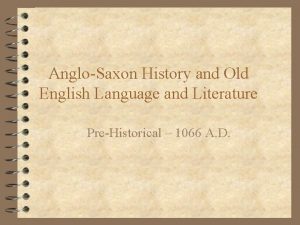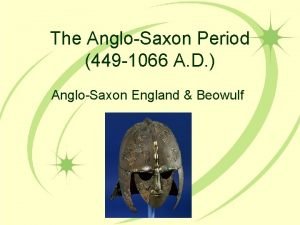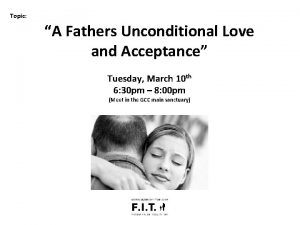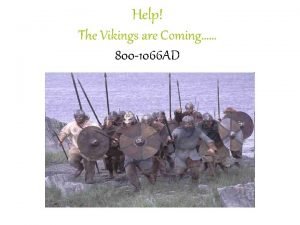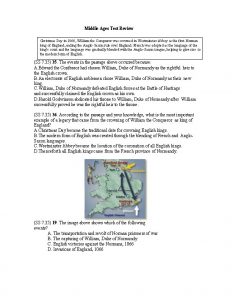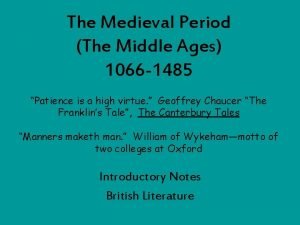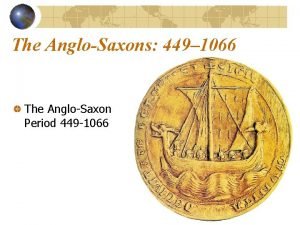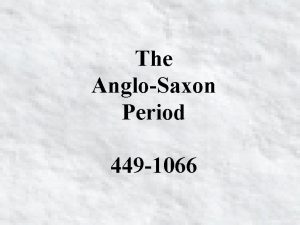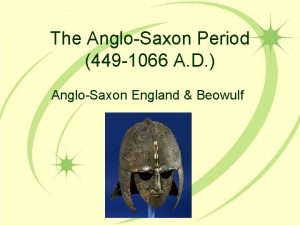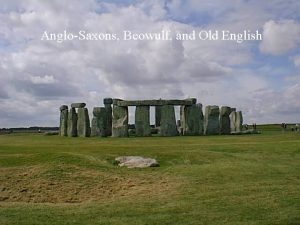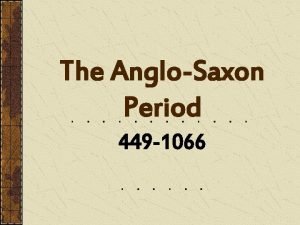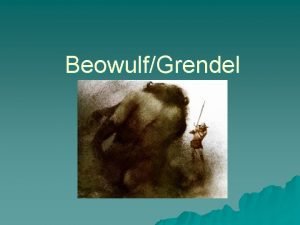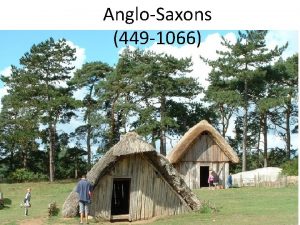Selfless Sacrifice AngloSaxon History The AngloSaxons 449 1066














- Slides: 14

Selfless Sacrifice: Anglo-Saxon History

The Anglo-Saxons: 449– 1066 300 s BC Celts in Britain Roman Occupation AD 1 Norman Invasion Anglo-Saxon Invasion 55 BC –AD 409 300 BC AD 1066 AD 449 AD 300 AD 878 King Alfred against the Danes AD 600 AD 400– 699 Spread of Christianity AD 900 AD 1200

The Celts in Britain Before and during the 4 th century BC • Britain is named after the Brythons, tall blond warriors who made up one of the Celtic tribes. • Celtic religion was a form of animism, Latin word for spirits. They saw spirits everywhere and in everything. • Druids, Celtic priests, performed religious rituals. Stonehenge, built 31001100 BC…some of the stones weigh as much as four tons and were transported some 240 miles

The Roman Occupation 55 BC Julius Caesar leads an invasion Hadrian’s Wall 43 BC Celts defeated and driven out by Emperor Claudius • Over the course of their rule, the Romans build walls, villas, baths, and roads (some still in use) AD 409 Romans evacuate their troops, leaving physical structures, but no central government • Britain is left a country of separate clans, making them vulnerable to attack Roman ruins

Germanic Tribes Invade Jutes Angles Celts Saxons AD 449 The invading tribes, Jutes, Angles, and Saxons, push the native Celts into the far west of the country, known as Wales, where they were led by a Welsh chieftain known as Arthur, the “once and future king. ”

The Anglo-Saxon Society • Germanic tribes settle the land that becomes known as Engla Land, or England. • The society is made up of small tribes led by a strong warrior chief to whom they were fiercely loyal. • Fame and success, even survival, were gained only through loyalty to the leader, who provided law and order. • They weren’t barbarians, but their lives weren’t peaceful, either, for enemy attack was a constant threat. • Lived in villages surrounding a communal hall, together they made communal, democratic, decisions. • People farmed, fished, and produced fine craftwork.

Anglo-Saxon Language �Their language, Anglish, now known as Old English, emerged as a written language, though most couldn’t read or write. �About half of our modern English words are formed from Old English

Old English � Eald = old � Brodor =brother � Hus =house � Nett=net � Riht =right � Wyrd=weird; to the Anglo -Saxons, the word meant fate. Shakespeare calls the witches in Macbeth the weird sisters; they inform Macbeth of his fate. Days of the Week �Sunday =Sunnandæg �Monday =Mōnandæg �Tuesday =Tīwesdæg �Wednesday=Wōdnesdæg �Thursday=Þūnresdæg �Friday =Frīgedæg �Saturday=Sæturnesdæg

Anglo-Saxon Religion • Offered no hope of an afterlife—dark and fatalistic • Valued ethics over mysticism, focusing on earthly virtues of bravery, loyalty, generosity, and friendship • Anglo-Saxon hero was someone courageous enough to control response to fate—rather than accept it, they would face it and fight it • Beliefs are similar to Norse mythology Norse god Anglo-Saxon god Day of week Odin Woden Thor Thunor Woden’s Day Thor’s Day

Anglo-Saxon Literature Anglo-Saxon bards (storytellers) • also called scops • strummed a harp as they sang songs about heroic deeds • were as respected as warriors because they provided an element of hope • Anglo-Saxons did not believe in an afterlife, but warriors could gain immortality through songs. If a bard sang about them, they lived forever in the collective memory Anglo-Saxon harp

The Spread of Christianity Around AD 400 • Christian monks settle in Britain • Christianity and Anglo -Saxon culture coexist By AD 699 • Christianity is widespread • Britain is culturally linked to the rest of Europe

Monasteries and Anglo-Saxon Literature � Christianity replaced the dark, pagan religion and provided hope, as well as a link to continental Europe � The monasteries served as a stronghold and developed into centers of learning and faith � Monks spent almost all of their daylight hours copying manuscripts by hand, preserving not only the Latin and Greek classics, but also great works of popular literature, such as Beowulf

King Alfred the Great against the Danes 8 th– 9 th centuries Danes, one of the fierce Viking people who crossed the sea in dragon-prowed boats, invade Britain. 871 Alfred of Wessex is king of England 878 Known as King Alfred the Great, he unifies the Anglo-Saxons against the Danes; England becomes a unified nation. King Sweyn and his Danish troops arrive in England, from a manuscript (c. 14 th century)

The Norman Invasion 1066 • William of Normandy, or William the Conqueror, crosses the English Channel • William defeats Harold and Anglo-Saxon army • French replaces English as the language of the ruling class, and a strict class system is enforced. The Norman Invasion, Bayeux Tapestry
 The anglo-saxon period 449 to 1066 answers
The anglo-saxon period 449 to 1066 answers Anglosaxon history
Anglosaxon history Old english kingdoms
Old english kingdoms Anglo saxon period
Anglo saxon period A fathers love is unconditional
A fathers love is unconditional Cs 449
Cs 449 Cs 449
Cs 449 Cpsc 449
Cpsc 449 Rounding money chapter 1 lesson 8
Rounding money chapter 1 lesson 8 Role of a judge
Role of a judge Posledice grcko persijskog rata
Posledice grcko persijskog rata Danelaw area
Danelaw area Middle ages test review
Middle ages test review Gcd(1970,1066)
Gcd(1970,1066) Middle ages 1066 to 1485
Middle ages 1066 to 1485


